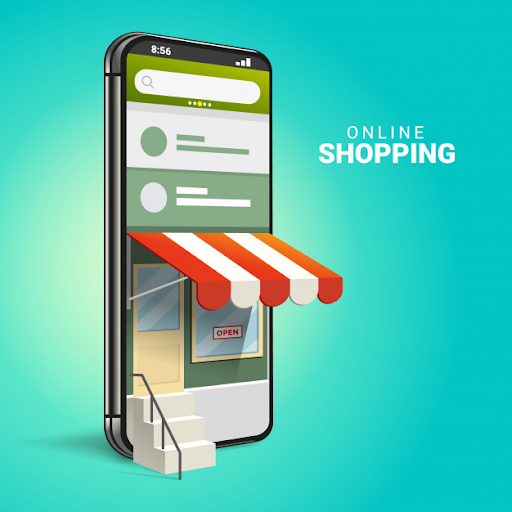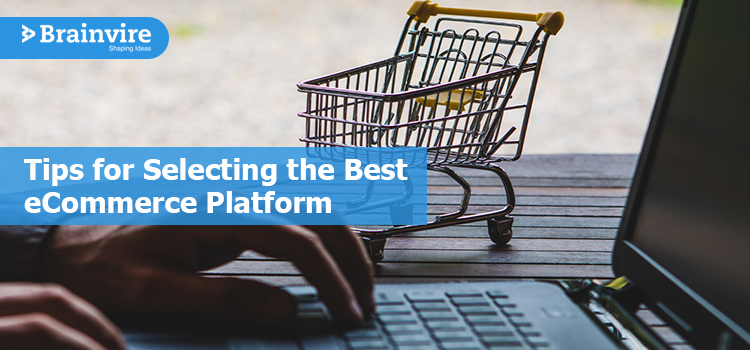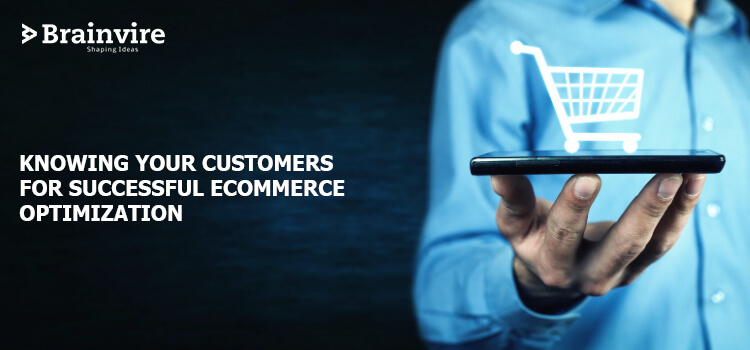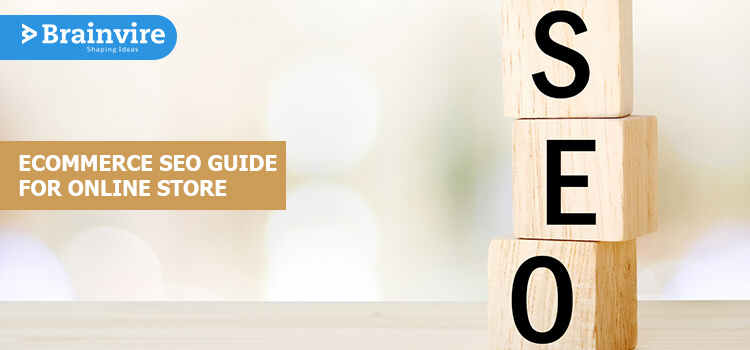What is an eCommerce platform?
Ecommerce is the modern way of doing business at a relatively lower cost. It has changed the way companies do business and communicate with customers. For almost every type of retailer, business, and enterprise moving onto an online store has become a mandate. Having an online business has various benefits for the retailers as well as the customers.

Image source: freepik.com
Ecommerce is considered as one of the biggest and most efficient growth drivers in today’s global marketplace. Almost every day eCommerce sales are increasing at an astonishing rate. Both B2B and B2C businesses are moving towards eCommerce as it is the future of doing business. If you think that you are ready to move on to eCommerce then the eCommerce platform that you chose is one of the most important business decisions that you will make.
In simple terms eCommerce software is a platform that allows any business to sell its products and services to its customers online with the help of a virtual store. Traditionally, organizations businesses willing to do business online had to invest a huge amount of funds for purchasing the premise, standalone eCommerce software, extensive IT setup, and in-house management with specialized technical and development teams. The older eCommerce solutions were very expensive, difficult to work with, had a complex customization process, and difficult to integrate with other systems.
Ecommerce solutions provide your business with a face that the customers see in the online market. Like any other business, an ecommerce business also needs additional software to manage other departments and functions like accounting, inventory management, order management, aftersales service, and customer management. Having different software for different functions become very complex, difficult to manage, and quite expensive.

Luckily the development and advancement in the e-commerce software have led to the integrations of all the different software that an online business requires along with the eCommerce solution. Now you only need one single eCommerce software to do business online and manage all the different functions and departments. It has become more cost-effective, all thanks to the software-as-a-service (SaaS) model as you don’t need to invest in the infrastructure and technical expertise.
The modem e-commerce solution unifies all the different business applications helping you to offer relevant, engaging, and personalized online experience.
The latest e-commerce platforms help you to get a unified view of customers across different channels, centralizes order and inventory management system that enables you to fulfill orders from all your sales channels. And it provides you with complex customer insights that help you to offer them personised offers and experience.
Reasons you need an Ecommerce platform for your business and its benefits

Above, we discussed what basically is an e-commerce platform, now we will look at the reason why you need to use an eCommerce platform for your business. Ecommerce platforms have a number of benefits for the business associated with it and they are as follows:
1. Easy, quick and time-efficient
Unlike a traditional brick and mortar store, your eCommerce store can be up and running at any hour of the day and on any day of the year. All you need to do is just click a button on your mobile device or computer and the store is right in front of you.
eCommerce platforms like Squarespace, Shopify, BigCommerce, etc, have premade templates that can help you create your store. It is a very easy and quick process to set up your store on these platforms and the platforms also take care of the maintenance, hosting, compliance, and more.
However with marketplaces like Amazon or eBay, you don’t have to create your own store, all you need to do is set up an account before you start selling.
SaaS-based e-commerce has made it very easy for business owners to make attractive and reliable online stores with minimum efforts in the lest possible time. Even if you don’t have expertise in technical stuff or eCommerce, you can easily start a professional website within no time. You can even make your website grow to a certain level before you choose to hire onboard a digital agency to take it to another level.
With the help of an e-commerce solution, you can help your business take off quickly.
2. Cost-effective
When you are planning to set up a traditional brick and mortar retail store, you need a huge amount of investment as you will have to spend on the rent or acquisition of a storefront, inventory, payroll, and alot of other costs associated with it.
However on the other hand, if you are planning to set up an online store, the cost and expenses associated with it are far less as compared to a physical store. The cost to set an e-commerce store can get low due to the following reasons:
- Most of the ecommerce platforms are free to sign up or charge a minimal fee which is as low as 20 dollars a month
- Most of the marketplaces are free and take a small percentage on the items sold as their fees
- You don’t have to hold huge inventory as you can use the dropshipping model to procure and supply products
- You can run and manage the entire online store by yourself which eliminates the need to hire employees
- Online promotions and marketing is also less expensive and is more effective
When you are planning to start your new store, then an ecommerce platform will help you to avoid huge investments which otherwise would be mandatory for a physical store.
3.Shoppers’ first preference

More and more people are becoming familiar with the internet and its utility. That’s the reason why online stores have become the first preference of buyers planning to buy any item. Even if they buy from physical stores, they begin their search for the products online.
More than 80 percent of shoppers begin searching for products online.
The main reason why online stores are shoppers’ first preference is that they get to compare prices, compare brands, and check customer reviews on online stores and marketplaces. The only way to grabbing your potential customer’s attention is by having an online presence.
4. Easy to reach new customers

Selling your products through different online channels can help you reach different types of customers. Each online channel has its unique set of audiences that you can capture. Whichever online channel you use, you will be able to reach a wider set of audience as compared to physical stores.
Online websites and e-commerce platforms can help you reach international customers where are social media sites can help you reach new demographics. Social sites can reach new demographics.
Famous marketplaces like Amazon will help you with the widest and quality audience. Certain market places serve customers looking for specific products or services. If you want the best and the widest reach and engagement, then you will have to use a mix of all these touchpoints.
5. Provides customer data and insights
If you want to serve your customers in the best possible way, then you need to know everything about them. With a physical brick and mortar store, it is very difficult to get customer data which is very important for your business.
However, one of the main advantages of selling online is that you have easy access to the customer. Whether a person purchases any product or not from your online store, you get the required data and information about the customer.
If customer experience is your number one priority, then you need to have your consumer data. Online selling makes the collection of first-hand data of the customers by tracking their interactions. You can use these customer data and insights to continuously innovate your customer experience.
6. Reach customers wherever they are

To make a sale with a physical store, you need the customers to reach your store, but with an ecommerce store, you can reach your customers at any time and any place.
Shoppers not only research products online, but they also complete purchases online. With the help of an online store, you can not only reach the customers where ever they are, but you can also make them hit the purchase button. That’s how online stores help you to achieve a hinge volume of sales.
Shoppers can find your products and make purchases from Instagram and Facebook Ads, mobile apps, and more. E-commerce solutions help to make the purchasing process hassle-free and convenient for the customers.
Sell your products through a channel where your customers are. If your customers buy products online, then make sure you are there with your online store to serve them.
7. Facilitates content marketing strategy

An online store allows you to provide all the relevant information about the products like its features, uses, benefits, price, availability, etc. to your customers. Most of the big online marketplaces offer sellers a place where they can provide key content to the customers.
Key product content includes in-depth product information, product comparisons, availability, and pricing. This product information helps the customer to make purchase decisions for both online and in-store purchases.
Blog posts, contents, and videos also help to provide helpful information about the products and services that you offer. Content marketing helps o increase the traffic on your website which ultimately helps to increase sales.
For example, automobile companies can provide tips for taking care of cars during monsoon on their website. This type of content is helpful for the customers and at the same time increases engagement.
Important ecommerce features and things to keep in mind when choosing the best e-commerce platform
Above we discussed the benefits of e-commerce platforms and the reason why you need to have an online store. Now let’s look at the must-have features for an ecommerce platform and the things that you need to keep in mind when choosing the best ecommerce platform.
1. Pricing and terms of payment

The first and the most important thing that you need to consider while searching and before deciding on an e-commerce platform is the pricing and cost of the platform. Doesn’t matter if you are starting a new eCommerce business or you are a well-established business planning to open an online store, the first thing you need to understand is how much you are going to spend for your online store.
All the ecommerce platforms have monthly fees. Consequently, different platforms have different fees depending on the services that they offer. You should also consider the processing fees that will be associated with the platform. You need to understand the pros, cons, and services offered by various e-commerce platforms and select the one that serves your purpose and fits in your budget. Don’t sacrifice on the must-have features just to cut down on the cost.
Another important feature to consider is how your customer will make the payment. Most of the customers will be paying online and if a platform does not support third-party vendors like PayPal then it can cause inconvenience to the customers. In order to prevent this inconvenience and shopping cart abandonment, make sure the platform you chose is flexible in terms of payment.
2. Safety and security

The second most important feature that you need to consider is safety and security. You need to make sure that the platform that you have shortlisted is safe and secure. E-commerce should be compliant with PCI DSS payment solutions. PCI DSS compliant payment solutions are secure and safe payment processors.
Some of the popular PCI DSS compliant payment solutions are –
- PayPal
- Stripe
- WorldPay
- SecurePay
The platform must support these payment solutions to ensure that the customers make the payment without any hassle.
Another feature that makes eCommerce platforms secure is Google Captcha. The captcha on your site ensures that the hackers or spammers are not able to harm your site.
3. SEO friendliness

Search engine optimization is one of the most important and the easiest way to make sure that your website is on the top of the search results. SEO is extremely beneficial to make your website rank higher in the search results.
SEO will make sure that your customers find your online store or website on the number one position while searching for the products that they need. That’s the reason why it is very important for the e-commerce platform that you select to offer basic SEO friendly features like adding captions and description in images, adding a custom domain name, adding tags wherever required, etc.
SEO will give a boost to your website and increase the traffic and sales of your online store.
4. Mobile-friendliness

In recent times, the mobile phone is the most used electronic device. People of almost all ages use mobile phone for accessing the internet. More than 79% percent of people use mobile phones to search for products and services that they require and intend to buy. That’s the main reason why your ecommerce stores need to be mobile-friendly.
You might end up losing on a sale if your website is not compatible with mobile devices as most of the time these searches on mobile devices result in final purchases.
Look out for an eCommerce platform that is compatible with mobile devices and has a mobile responsive theme or template or go for a platform that offers a mobile application. Mobile applications make it very easy for customers to search for products, place orders, and make payments.
5. Product management system

The product management system is a basic feature of a commerce platform that helps you to upload your products and manage your product listings. The latest e-commerce software has a product management system that offers alot more than managing your product listings.
The latest product management system helps to create different categories and segments and distribute the products to those categories accordingly, enable you to attach different shipping options with individual products, dynamic filters to sort and search for products, etc.
6. Order management system

In recent times, alot of new ecommerce businesses have come into existence making it a highly competitive business. With the competition so high, you don’t want your orders to take a long time for the processing which might lead to customers shifting to other brands.
That’s where the role of the order processing system comes into the picture. An ecommerce platform with an effective order management system offers features like live order tracking, email or SMS notifications, etc. All these features help to ensure that orders are being processed accurately and within no time.
There needs to be timely and effective communication between OMS and the inventory management system so that the stocks are updated regularly and correctly. This ensures that only products in stock are put for sale.
7. Customer service

The main aspect of any business is to ensure that the customer is satisfied and is leaving your store with a smile on your face. The way your online store is designed plays a major role in customer satisfaction.
Offering your customers the product that they need, offering personalized discounts and offers, being available for the customers 24 by 7, etc plays a major role in keeping your customers happy. Select a platform that offers you the best customer services.
8. Scalability
Every business runs with the aim to grow and so does ecommerce business. As a business owner, you might not know to what extent your business will grow. Every business owner wants business solutions that will grow along with the business and should be able to handle large scale operations.
This is the most important thing for an online store in the ecommerce platform. You need to select a platform that you can scale tp the size without exorbitant fees for doing so. Scalability is a very important factor that you need to consider while selecting as eCommerce platform as ecommerce business tends to grow at a very quick rate.
List of best Ecommerce platforms
The following are the list of best 6 e-commerce solution providers :
1. WIX.com
Wix.com Ltd is one of the leading software companies which is based in Israel. WIX.com is known for providing cloud-based solutions and web development services.
It is the most commonly used ecommerce platform that allows users to create websites and mobile sites through the use of online drag and drop tools. The Wix website builder is free to use and it earns its revenues through premium upgrades and service purchases.WIX.com is built on a freemium business model which makes it perfect for new users.
Pricing – 17 to 35 dollars per month
2. Squarespace
Squarespace is a well-known American software company based in New York. Squarespace provides software as a service for website building and hosting. On Squarespace, you can use the pre-built website templates and drag and drop elements to create webpages and online stores.
- Pricing – 26 to 40 dollars per month
3. Shopify
Shopify is one of the biggest and most commonly used commerce platforms. Anyone on Shopify can set up an online store and sell their products. Merchants can also sell their products in person with Shopify POS.
- Pricing – 29 to 299 dollars per month
4. Bigcommerce
BigCommerce is a privately owned software company. It is well known for providing software as a service ecommerce platform. Bigcommerce is based in Taxes and has more than 600 employees working for it. The main features of Bigcommerce include Search engine optimization, web hosting, integrations with other software, easy to use, customer grouping and segmentation, and alot more.
- Pricing – 29.95 to 299.95 dollars per month
5. Woocommerce
WooCommerce is an open-source e-commerce platform. Doesn’t matter if it is big or small, it is descended for all types of sellers using WordPress. WooCommerce gained popularity due to its ease of use, easy installation, and customization, and free base product.
- Pricing – starts with 100 dollars for a year
6. Magento Ecommerce
Written in PHP, Magento is an open-source ecommerce platform that uses multiple languages including Symfony and Laminas. It provides online merchants with a flexible shopping cart system, along with offering control over the look, functionality, and content of their online shopping store.
On top of that, Magento also offers powerful tools revolving around marketing, catalog-management, and search engine optimization.
- Pricing – Magneto’s premium enterprise edition starts at 22,000 dollars for a year









